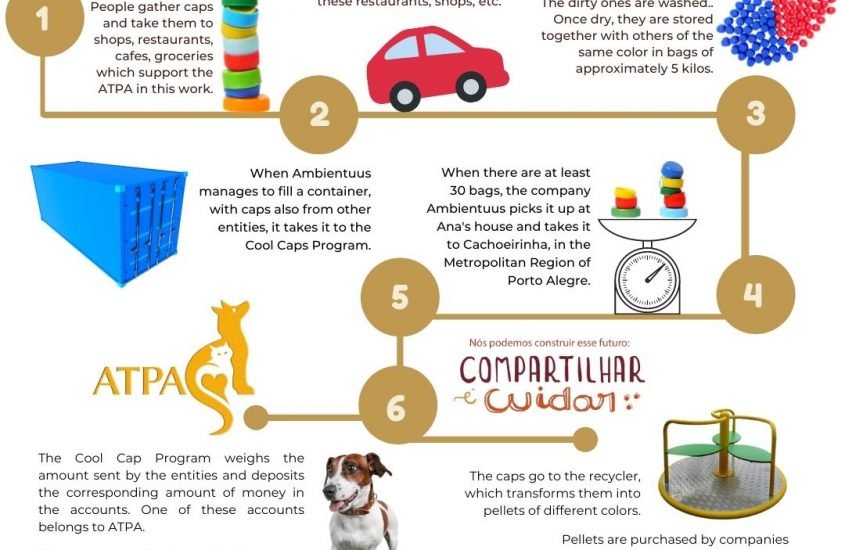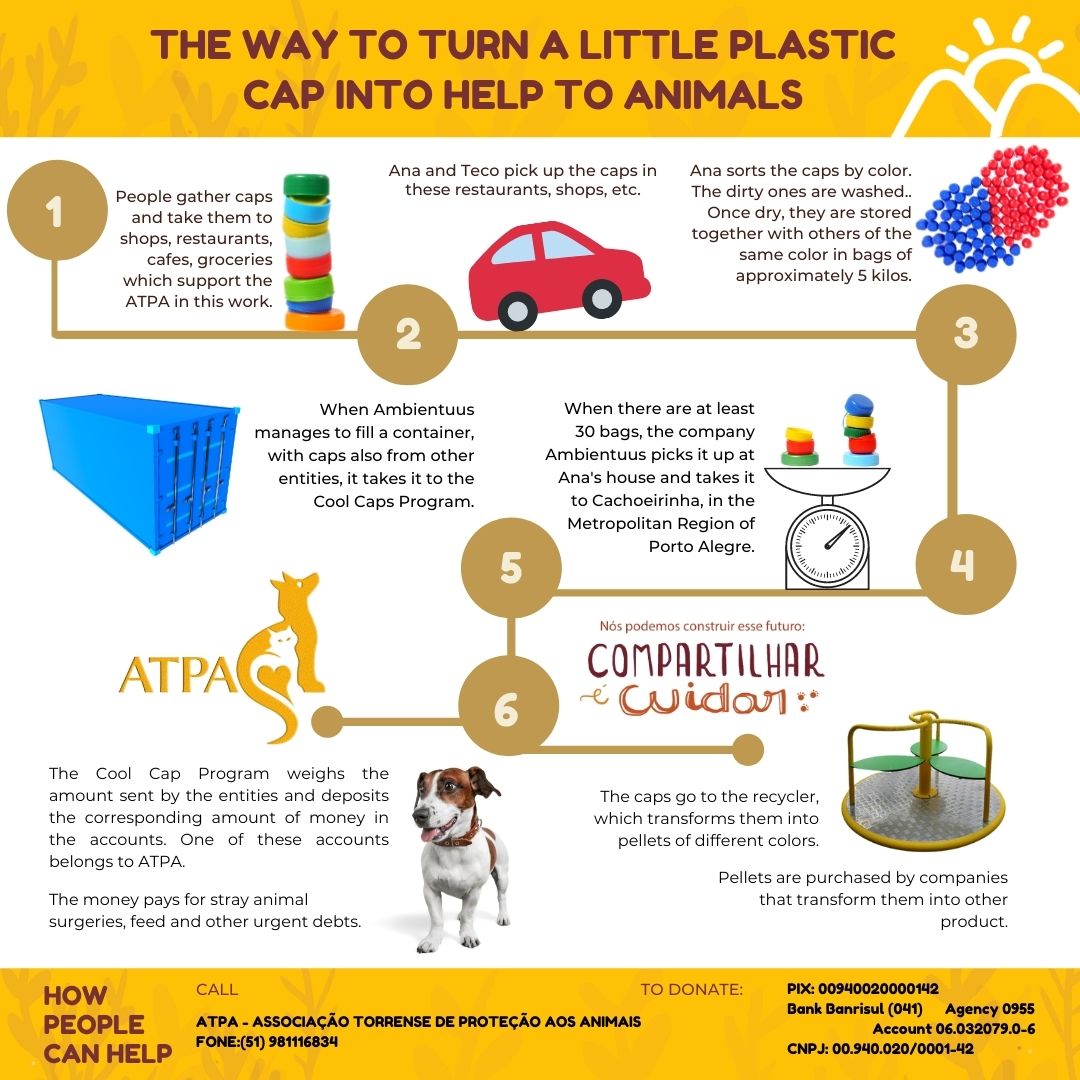Sharing is Caring: love for animals turns plastic bottle caps into food and surgeries


Ana Telles with Amora. The dog checked the shipment of 46 bags of plastic bottle caps on September 23, 2021. Amora was adopted at the kennel of the municipality
Soon, 230 kilos of plastic caps will be transformed into food, surgeries and veterinary consultations for street animals or animals of low-income guardians in Torres. The metamorphosis won’t be the result of any magic, but of approximately 350 hours of dedication from Ana Telles, a volunteer from the Associação Torrense de Proteção aos Animais. Since July 1st, when she sent a 165 kilo shipment to Tampinha Legal, in Porto Alegre, she has started again the collection, selection, cleaning and storage of more bottle caps, in a work she has been doing for four years.
Ana recalls that she learned about the creation of the socio-environmental program in 2017 thanks to her habit of reading newspapers every day. From then on, she sought information, attended meetings, and managed to register the ATPA. “At the beginning it was very little, they paid I think R.80 (the kilo of the cap). Even so, it was a lot of money! We collected more than 80 bags. I had nowhere else to put them”.
To get the material, she has the support of her husband, people who save bottle caps, and local businesses. “I get the lids used in the coffee shop from Vosso Pão Bakery. I also collect at the Grill Brasília the ones used in the restaurant and by some employees, at Monsieur Café. I collect a lot at Jaqueline Lima -a beauty salon-, at Peg Pag, Casa do Agricultor and Ecotorres”.
In general, in these places, the employees support the animal cause and therefore reserve some place and time for the caps. At the Farmer’s House, Alessandra Pedroso says that people leave their donations and, in a space that is not that large, the employees keep them until Friday or Saturday. “When Ana can’t come to pick them up, Paulo (Oliveira) delivers them to her house, because sometimes there is a lot of them.
In general, in these places, the employees support the animal cause and therefore reserve some place and time for the caps. At the Farmer’s House, Alessandra Pedroso says that people leave their donations and, in a space that is not that large, the employees keep them until Friday or Saturday. “When Ana can’t come to pick them up, Paulo (Oliveira) delivers them to her house, because sometimes there is a lot of them.
The Ecotorres Consumer Cooperative also doesn’t have extra space, yet it still keeps the caps. “The cooperative is just a collection point. “Of course, I collect them in my house and put them here, because I support the cause”, explains Dauane Scheffer. The employee also highlights the support to other ATPA actions to raise funds: sale of calendars, cups, and whatever else is needed to collaborate.
According to ATPA president Maria da Graça Scherer Nogueira, this work that each person does by collecting the caps is fundamental to maintain the entity’s projects. “It is the will to help the animals and the concern with the environment. Ridding nature of so much plastic. I think this is very cool! And I am grateful to all of them. Alone we are weak, but when we get together, in any fight, we become strong.
The path of the caps
After collecting the plastic caps at the collection points, Ana separates them by color: black, blue, green, orange, yellow, red, white, brown, and transparent. She explains that this separation is very important, because when they go to the recycler, they are transformed into pellets of these same colors, which other companies will buy to make different products.
The caps are sanitized. Some need to be soaked in water with bleach and brushed. When they are dry, they are placed in bags that hold an average of 5 kilos. When she manages to collect at least 30 bags, the volunteer informs Ambientuus Environmental Technology.
This company, which collects hospital garbage, was called by Tampinha Legal (Cool Cap) itself, because Ana was unable to get transportation. “A lot of people said they would help, but in time, they couldn’t. There was a moving company that told me they were going to help me that kept me waiting several times”.
So Ambientuus took on the task of taking the caps from Torres to ATPA and the Association of Parents of Excepcionais (Apae). The company collects them from other registered charities along the coast and stores them until they fill a container at its plant in Cachoeirinha, in the Porto Alegre metropolitan region. Only then does it take them to the Porto Alegre delivery point, at the Social Banks Foundation of the Federation of Industries of Rio Grande do Sul State (Fiergs), in the capital.
There, the caps are weighed again and the amount corresponding to the quantity of material sent is deposited in each entity’s account. Tampinha Legal sells to recycling companies that transform the caps into pellets. “The amounts obtained are fully allocated to the participating charities without apportionments or transfers and without the program receiving commissions and/or bonuses on the collected material,” informs the program’s release.
The Tampinha Legal (Cool Cap)
An initiative of the SustenPlást Institute, the Cool Cap is, according to its press office, the largest socio-environmental program of educational character in circular economy of the plastic transformation industry in Latin America. In four years, it has already collected more than 390 million plastic caps that were reverted into more than R$ 1.4 million in resources destined integrally to the 339 participating assistance entities.
Besides Rio Grande do Sul, the program operates in Santa Catarina, Minas Gerais, São Paulo, Alagoas, Pernambuco, Goiás, and in the Federal District. In Porto Alegre, it is supported by the Fundação Gaúcha dos Bancos Sociais (Social Banks Foundation) of the Federation of Industries of the State of Rio Grande do Sul (Fiergs). On the site and in the application it is possible to locate collection points, registered entities, and participating companies. Cool Cap is also on YouTube, Instagram and Facebook.
Why did the Centro Ecológico tell this story?
Because it considers that volunteer work with animals and this action with the bottle caps is 100% aligned with the proposals of the Share is Caring campaign, the Centro Ecológico wanted to register and tell this story. Since 2018, the Share is Caring campaign is held in October during the Green Action Week, coordinated by the Swedish Society for Nature Protection in more than 30 countries and approximately 40 organizations.
Fonte: Portal Centro Ecológico







No Comments